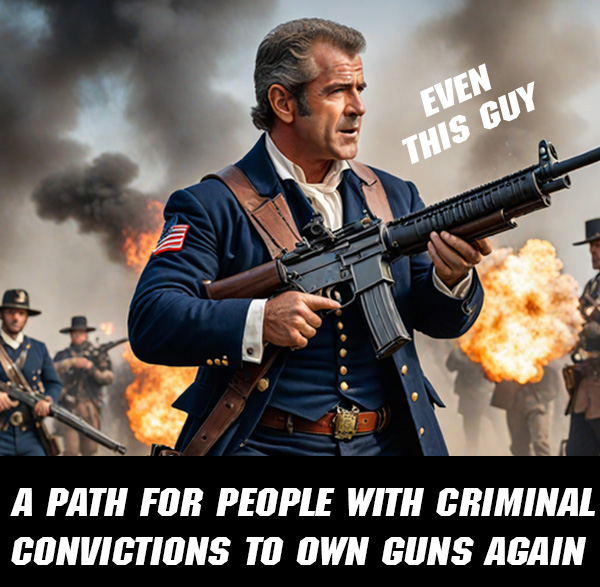Gibson, who in January was named a “special ambassador” to Hollywood by President Trump along with Jon Voight and Sylvester Stallone, would be permitted to own firearms again depending on state laws. Gibson is a resident of Nevada, which prohibits felons owning guns, but Gibson’s conviction was a misdemeanor.
The Justice Department has approved Mel Gibson‘s rights to own guns again after a 2011 domestic violence conviction.
The debate over Gibson’s gun rights caused considerable upheaval in the Justice Department, and the department’s pardon attorney Elizabeth G. Oyer was fired by the Trump administration in March after expressing concern over letting the “Passion of the Christ” director be able to possess firearms.
Earlier this year, Elizabeth G Oyer said that she was asked to join a working group reviewing cases of individuals with past convictions who could be eligible to restore their gun rights.
After narrowing down the candidates to nine people with old convictions and a low risk of recidivism, Oyer said senior Justice Department officials asked her to add Gibson to the list, despite his 2011 misdemeanour conviction for domestic violence.
In a column for Rolling Stone, Oyer wrote: “No one has told me why I was fired. But the notice was delivered hours after I declined to recommend reinstating the gun rights of a famous friend of the president, the actor Mel Gibson, who has a history of violence against women.”
Oyer also told CNN: “When I came into work on Friday morning, I said to a colleague, I really think that Mel Gibson might be my downfall, and within hours of saying that, I was being escorted out of my office”
Attorney General Pam Bondi approved the restoration of the actor’s gun rights, along with nine other people, the New York Times reported.
Kris Brown, president of Brady United Against Gun Violence, said in a statement, “You can’t claim to be ‘tough on crime’ while arming domestic abusers. The Trump Administration’s decision to restore gun rights to Mel Gibson exposes their real agenda: rewarding political allies while creating a pipeline to put guns back in the hands of felons and violent offenders. We keep guns away from abusers because firearms increase homicide risk by 400%. Period.”
“Giving guns back to domestic abusers is a serious matter that, in my view, is not something that I could recommend lightly, because there are real consequences that flow from people who have a history of domestic violence being in possession of firearms,” she said at the time.
A senior Justice Department official denied that her firing was related to the debate over Gibson’s gun rights, the NYTimes reported.
New regulations were recently published by the Justice Department that restore gun rights to certain people with criminal convictions as long as they have “earned the chance” to own guns again.
Gibson pleaded no contest to a misdemeanor charge of battering a former girlfriend, Oksana Grigorieva. He was sentenced to 36 months of probation as well as community service and counseling.
The move would hand a victory to gun rights supporters less than a year after the Supreme Court ruled that the government could restrict firearms access to people facing restraining orders for domestic violence. Shortly after Attorney General Pam Bondi was confirmed in February, Mr. Trump ordered a review of the federal government’s gun policies.
The department still supports laws ensuring “violent and dangerous people” cannot lawfully acquire firearms, as long as there is “an appropriate avenue” to restore rights to people who have earned the chance to own guns again, according to an interim rule set to be published on Thursday in The Federal Register.
Determining whose gun rights should be restored depends on a number of factors, the notice says, including “a combination of the nature of their past criminal activity and their subsequent and current law-abiding behavior.”
Under a decades-old law, the Bureau of Alcohol, Tobacco, Firearms and Explosives can return gun rights to specific people. But starting in 1992, congressional spending bills barred the A.T.F. from doing so.
The interim rule would effectively give that authority to the attorney general, who would then delegate it to another Justice Department official or office.
As the Trump administration prepared to reverse some limits on gun ownership, Justice Department officials debated who should be eligible. They quickly ruled out murderers and armed robbers. But they considered whether domestic abusers should get their rights back, and how many years should elapse before gun rights are restored.










